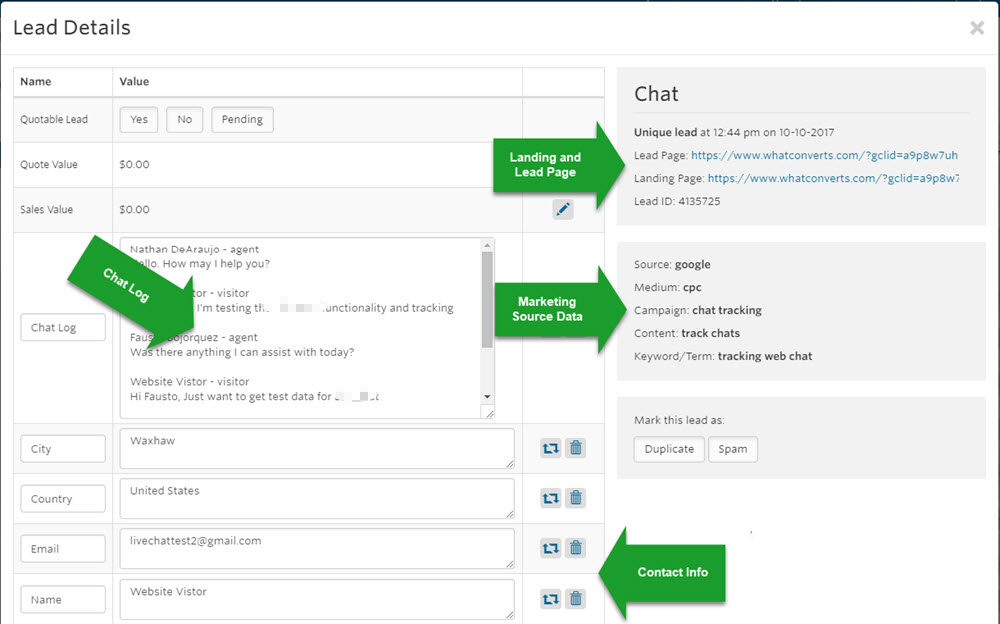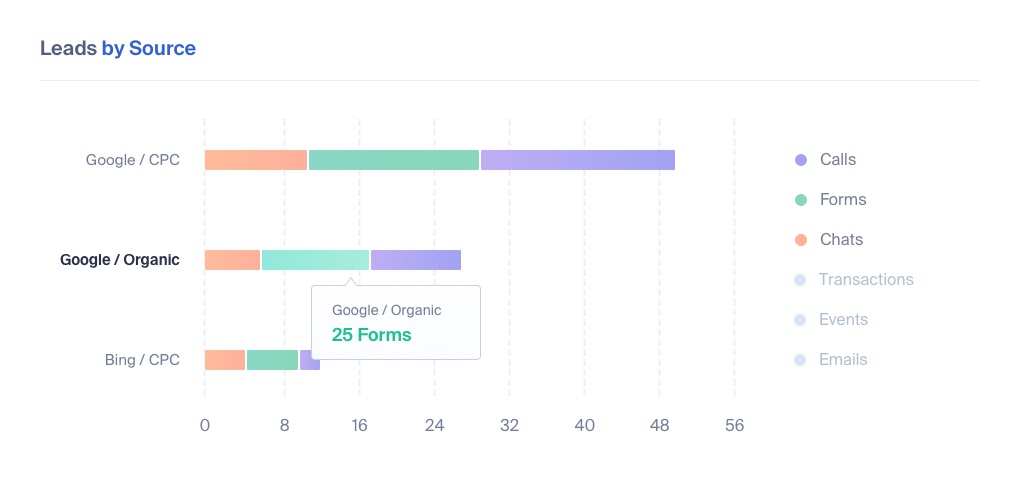Live chat is no longer a luxury. In 2021, it’s a necessity.
Not only are customers happier when they use live chat, but live chat can lead to massive increases in leads. In fact, one homebuilding business recently saw an 800% increase in online prospects after implementing live chat.
The question isn’t whether you should use live chat, but how to get the most leads from your live chat service. You get chat leads by driving qualified traffic to your website.
This is where marketing plays a big role.
The term, “marketing” is broad and it invites a few questions:
- Which marketing drives traffic to your site?
- Which marketing channels deliver your most valuable chat leads?
- Which marketing campaigns deliver the best return on investment?
- If you spend more on certain marketing channels, will you get more chat leads?
To answer these questions, you have to be able to do three things; track, organize and report on every chat lead. Below, we’ll explain how marketing attribution can reveal which marketing actually drives your most profitable chat leads.
Capture Marketing Data for Every Chat Lead
When a new chat lead comes in, you should know where it came from. Was it an organic search, a PPC click, an email click, or a referral? If you know where your lead came from, you can give credit to the marketing that worked.
This is a good start, but your lead tracking software should do more than just track the marketing source. For instance, WhatConverts also captures the following data:
- Landing page
- Lead page (page the lead was on when they started the chat)
- Full chat transcript
For PPC ads, you should be capturing:
Here’s what the full ApexChat lead looks like with detailed lead tracking:
This lead is stored in a dashboard alongside all your other leads from form tracking, phone calls, and transactions. When you’ve got all your leads stored in the same place, you can move on to the next step.
Organize, Qualify, and Value Chat Leads
Let’s say a current customer sees your company’s PPC ad, clicks on it, and then starts a chat because they need support. This would be marked as a Google PPC lead despite the fact that you aren’t getting any additional revenue from this person.
Here’s another situation; a salesperson Googles your company, visits your website, and starts a chat with the intention of doing sales outreach. This person isn’t going to become a customer, but they’ll be counted as a Google organic chat lead nonetheless.
Situations like these are why it’s important to filter leads. According to data from Forrester, 37% of marketers waste marketing spend because of poor data.
Without a lead qualification system, you run the risk of misattributing leads to marketing sources. This can skew your marketing data, making it seem like some channels are more effective than they actually are.
Lead management is the process of qualifying and assigning value to leads while weeding out junk leads. It helps you find out which marketing delivers your most valuable leads.
When you can see the chat transcript right there next to each lead, it’s easy to qualify and assign value to leads. If the transcript mentions certain products or services, you can assign value based on the price of those products/services. If you notice that the chat is spam, a salesperson, or existing customer, you can disqualify the lead and get it out of your marketing data.
Report on Your Chat Leads
The big problem in reporting today is too much reliance on marketing metrics. Marketing metrics are metrics that don’t have to do with sales, such as:
- Clicks
- Impressions
- Page Views
- Web Traffic
- Bounce Rate
These metrics tell marketers if their efforts are working, but they don’t directly correlate to sales. That’s why lead-based reports are preferable. Lead-based reporting shows the connection between marketing channels and leads, and every business person can easily make the connection between leads and revenue.
When you report with sales metrics instead of marketing metrics, you can show clients or CEOs how your marketing budget is bringing in chat leads. It’s also easier to find insights that will bring in more revenue from each marketing channel moving forward.
Using Blazeo (formerly ApexChat) with a lead tracking platform like WhatConverts will help you get more out of your live chats. Instead of simply setting up the live chat and waiting for leads to come in, you can use detailed data to fine-tune your marketing so that it delivers qualified web traffic. Every single chat will help you improve the process, as new data helps you answer the question, “what marketing actually works?”




